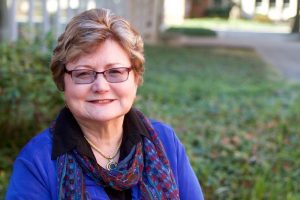In Their Own Words: A Conversation With the Author
 On October 23, Immanuel will welcome scholar and renowned organist, Dr. Eileen Guenther, as she
On October 23, Immanuel will welcome scholar and renowned organist, Dr. Eileen Guenther, as she
discusses her book, In Their Own Words: Slave Life and the Power of Spirituals. This groundbreaking study of slavery and spirituals is the first to place the unique voices of an enslaved people squarely within the context of their daily lives. Dr. Guenther’s deeply researched account weaves a succinct history of America’s original sin into an examination of the role of singing and religion in slave life and directly correlates slave testimonies in their own words to the themes of Spirituals. Copies of In Their Own Words will be available for purchase during the book-signing portion of the evening. Below, Dr. Guenther and Billy Kluttz, Immanuel in the Evening Coordinator, discuss her book and upcoming conversation at Immanuel.
BK: This book is an amazing collection of scholarship and spirituality. I was moved by your ability to analyze spirituals as an important theological source both during slavery in the United States and now during our continued struggle for racial equity. At the book’s opening, you remind the reader of the power of spirituals today by drawing on the use of song in remembering the Charleston Nine. Given recent movements for racial justice, I wonder what your initial inspiration was for this book? Is there a recent event or experience that made you decide to begin writing?
EG: I began working on this book over 10 years ago, as a result of team-teaching a course with Rev. Dr. William B. McClain, Songs of Zion. I had been captivated by the impact Spirituals had when they were sung in services, and teaching the course led me to more reading and research on the history of slavery and the context that gave birth to the music.
BK: I wonder what is the most interesting story or fact that you learned in your research for this book?
EG: The power of music to give hope. I believe that with every fiber of my being – and there is no greater example of this than in the Spiritual. There’s a reason that there are more Spirituals on the subject of freedom than on any other subject – whether freedom from slavery, or spiritual freedom in the afterlife. They’re the same music!
BK: What is your favorite spiritual to sing or play? Why is it your favorite?
EG: In some ways it’s “My God is a Rock,” because of the interweaving of Jesus’s ministry on earth and the power of God – and the arrangement by Parker/Shaw is riveting. I also like “Wade in the Water” a lot because of the different layers of meaning (which I’ll talk about at the event!) – and perhaps my ultimate favorite is “Welcome Table,” because of the message of inclusion for all.
BK: Your book is both an academic resource and a gift to worship leaders (I’m thinking especially of the incredible reverse concordance detailing Scripture references in spirituals). How do you hope your book will impact those who lead worship and those who sing spirituals?
EG: I hope it will convey an appreciation for all that the slaves endured and the power of their faith in a situation where there would seem to have been no earthly reasons for faith. I also believe the music can connect with hearts in a way that nothing else does, and can help to heal a wounded world.
BK: I love that you include the story of the Fisk University Singers and the Synod of the Presbyterian Church of Springfield, Ohio! The story of the Synod’s decision to support the group financially after being moved by the performance of spirituals was an inspiring example of music’s power to foster community across racial divides. I wonder how you think this book will help church communities discuss race and racism within their congregations and in their broader communities?
EG: I think reading and discussing it, if not chapter-by-chapter, at least by subjects, can bring fruitful conversation. I think the convicting line “Everybody talkin’ ’bout heaven ain’t goin’ there” is one that should direct our actions on a daily basis. And of course, listening to the music, singing the music, engaging the message of the music. That can bring understanding and healing.
Click here to learn more about Dr. Guenther’s upcoming talk and invite your friends and family.
